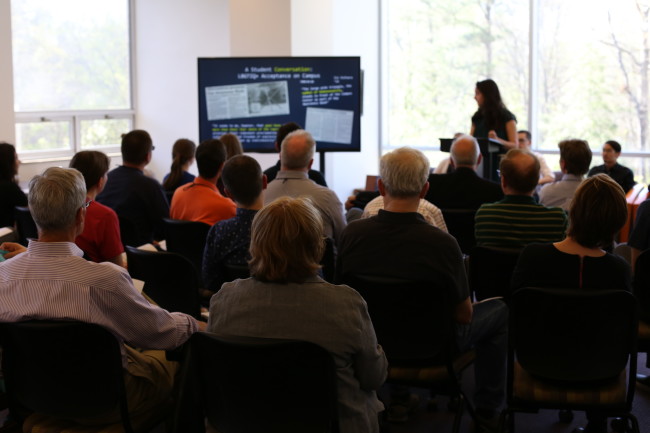Members of the College of William and Mary community gathered Tuesday, April 4 to hear students present inaugural research for the William and Mary Mattachine LGBTIQ Research Project: Documenting the LGBTIQ Past in Virginia.
Until 25 years ago in Virginia, laws illegalized the sale of alcohol to homosexuals; until 13 years ago, anti-sodomy laws criminalized sexual acts between LGBTIQ people; and less than two years ago, the state denied same-sex marriages.
Speaking about different aspects of LGBTIQ Virginia history, researchers discussed Virginia LGBTIQ issues in terms of student life, the repealing of discriminatory Alcoholic Beverage Control (ABC) laws, cases on child custody, the controversy surrounding extending employee benefits to same-sex partners, and religious support.
The Mattachine Society of Washington, D.C., a non-profit organization that conducts archival research to study LGBT legal and political history, provided the initial funding for the project in Nov. 2015. Since then, the William and Mary Mattachine LGBTIQ Research Project has received support from 11 other individuals and organizations, including a recent IDEAS grant from the Center for Student Diversity.
Although some research has been done previously on the LGBTIQ history in the southeast, project fellow and American studies Ph.D. candidate Jan Huebenthal M.A. ’13 Ph.D. ’18 said that it has not been given proper attention.
“We live in a state that has a long and rich history of discrimination and oppression, not just in terms of race, but also in terms of gender and sexual orientation, and I think our project is unique in it that it kinds of inaugurates and institutionalizes a kind of attention to these questions on the William and Mary campus, which hasn’t really been done before,” Huebenthal said.
Student researcher Taylor Medley ’17 focused on the overturn of ABC laws discriminating against LGBTIQ people. Before researching, she said she knew the main plaintiff was Alexandria’s French Corner Café in Alexandria, but she found something she was not expecting: a connection to the College.
“In that Virginia Supreme Court Case, one of the plaintiffs was the William and Mary Gay and Lesbian Alumni Association, so GALA, and we didn’t know that — nobody knew that,” Medley said.
In that Virginia Supreme Court Case, one of the plaintiffs was the William and Mary Gay and Lesbian Alumni Association, so GALA, and we didn’t know that — nobody knew that,” Medley said.
Another student, Ming Siegel ’17, conducted research on the politics of LGBTIQ issues in Virginia. For some of her research, she did not even need to leave the College; in Earl Gregg Swem Library’s Special Collections, she looked through stacks of former College President Timothy Sullivan’s correspondences. In the early 1990s, the Faculty Assembly passed a resolution to allow employee benefits to the partners of gay and lesbian faculty members. However, Sullivan was against extending the benefits.
“He was very adamant in his correspondence with faculty members, staff, alumni, current students, parents of students and several members of the General Assembly that this was not the position of the college,” Siegel said.
Employee benefits were ultimately not extended to the partners of gay and lesbian faculty until after Sullivan left the presidency.
Noting the possibility of expanding the William and Mary Mattachine LGBTIQ Research Project formally into the curriculum, Meyer cited the new COLL system as a potential home.
“The COLL 150, the COLL 300, these seem tailor-made for a project like this that would enable both research to be done and energetic groups of undergraduates who are very interested in this research to do it and to get credit for it,” Meyer said.
Meyer said she expects further, more thorough research in Richmond and at the College, but also seeks to expand the project geographically to areas like Norfolk.
After one semester, Huebenthal said he was impressed by how much work the William and Mary Mattachine LGBTIQ Research Project was able to complete since beginning research 10 weeks beforehand.
“Just looking at how far we’ve been able to come and looking at the amount of work the students have been able to put in, to dedicate to the project, it’s really quite remarkable and I think heralds great things to come,” Huebenthal said.
Just looking at how far we’ve been able to come and looking at the amount of work the students have been able to put in, to dedicate to the project, it’s really quite remarkable and I think heralds great things to come,” Huebenthal said.
Primary sources found by the team members are currently available through Blackboard and accessible with College logins, but the materials will eventually be available on the William and Mary Mattachine LGBTIQ Research Project’s website.

